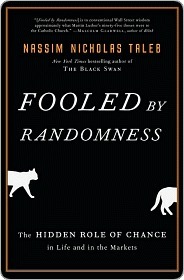More on this book
Community
Kindle Notes & Highlights
I believe that the principal asset I need to protect and cultivate is my deep-seated intellectual insecurity.
Reality is far more vicious than Russian roulette. First, it delivers the fatal bullet rather infrequently, like a revolver that would have hundreds, even thousands, of chambers instead of six. After a few dozen tries, one forgets about the existence of a bullet,
both risk detection and risk avoidance are not mediated in the “thinking” part of the brain but largely in the emotional one
rational thinking has little, very little, to do with risk avoidance. Much of what rational thinking seems to do is rationalize one’s actions by fitting some logic to them.
Our minds are not quite designed to understand how the world works, but, rather, to get out of trouble rapidly and have progeny.
A mistake is not something to be determined after the fact, but in the light of the information until that point.
For an idea to have survived so long across so many cycles is indicative of its relative fitness. Noise, at least some noise, was filtered out. Mathematically, progress means that some new information is better than past information, not that the average of new information will supplant past information, which means that it is optimal for someone, when in doubt, to systematically reject the new idea, information, or method.
minimal exposure to the media as a guiding principle for someone involved in decision making under uncertainty. If there is anything better than noise in the mass of “urgent” news pounding us, it would be like a needle in a haystack.
the media is paid to get your attention.
If an event is important enough, it will find its way to my ears.
people who look too closely at randomness burn out, their emotions drained by the series of pangs they experience. Regardless of what people claim, a negative pang is not offset by a positive one
they introduced rigor into intellectual life is by declaring that a statement could fall only into two categories: deductive, like “2 +2 =4,” i.e., incontrovertibly flowing from a precisely defined axiomatic framework (here the rules of arithmetic), or inductive, i.e., verifiable in some manner (experience, statistics, etc.), like “it rains in Spain” or “New Yorkers are generally rude.”
The best description of my lifelong business in the market is “skewed bets,” that is, I try to benefit from rare events, events that do not tend to repeat themselves frequently, but, accordingly, present a large payoff when they occur. I try to make money infrequently, as infrequently as possible, simply because I believe that rare events are not fairly valued, and that the rarer the event, the more undervalued it will be in price.
One cannot infer much from a single experiment in a random environment—an experiment needs a repeatability showing some causal component.
What has gone wrong with the development of economics as a science? Answer: There was a bunch of intelligent people who felt compelled to use mathematics just to tell themselves that they were rigorous in their thinking, that theirs was a science. Someone in a great rush decided to introduce mathematical modeling techniques (culprits: Leon Walras, Gerard Debreu, Paul Samuelson) without considering the fact that either the class of mathematics they were using was too restrictive for the class of problems they were dealing with, or that perhaps they should be aware that the precision of the
...more
there are routes to success that are nonrandom, but few, very few, people have the mental stamina to follow them. Those who go the extra mile are rewarded.
It is better to have a handful of enthusiastic advocates than hordes of people who appreciate your work—better to be loved by a dozen than liked by the hundreds.
wealth itself does not really make one happy (above, of course, some subsistence level); but positive changes in wealth may, especially if they come as “steady” increases.
we are not made to view things as independent from each other. When viewing two events A and B, it is hard not to assume that A causes B, B causes A, or both cause each other. Our bias is immediately to establish a causal link.
with children, we support those in whom we have a heavy investment of food and time until they are able to propagate our genes,
You attribute your successes to skills, but your failures to randomness.
research on happiness shows that those who live under a self-imposed pressure to be optimal in their enjoyment of things suffer a measure of distress.
I am convinced that we are not made for clear-cut, well-delineated schedules. We are made to live like firemen, with downtime for lounging and meditating between calls, under the protection of protective uncertainty.
A dozen minutes of fuzziness and variability in my schedule made a considerable difference. True, there are some activities that require such dependability that an alarm clock is necessary, but I am free to choose a profession where I am not a slave to external pressure. Living like this, one can also go to bed early and not optimize one’s schedule by squeezing every minute out of one’s evening. At the limit, you can decide whether to be (relatively) poor, but free of your time, or rich but as dependent as a slave. It took me a while to figure out that we are not designed for schedules.
Unpredictability is a strong deterrent.
Simple Heuristics That Make Us Smart is the title of a compilation of articles by Gigerenzer and his peers


